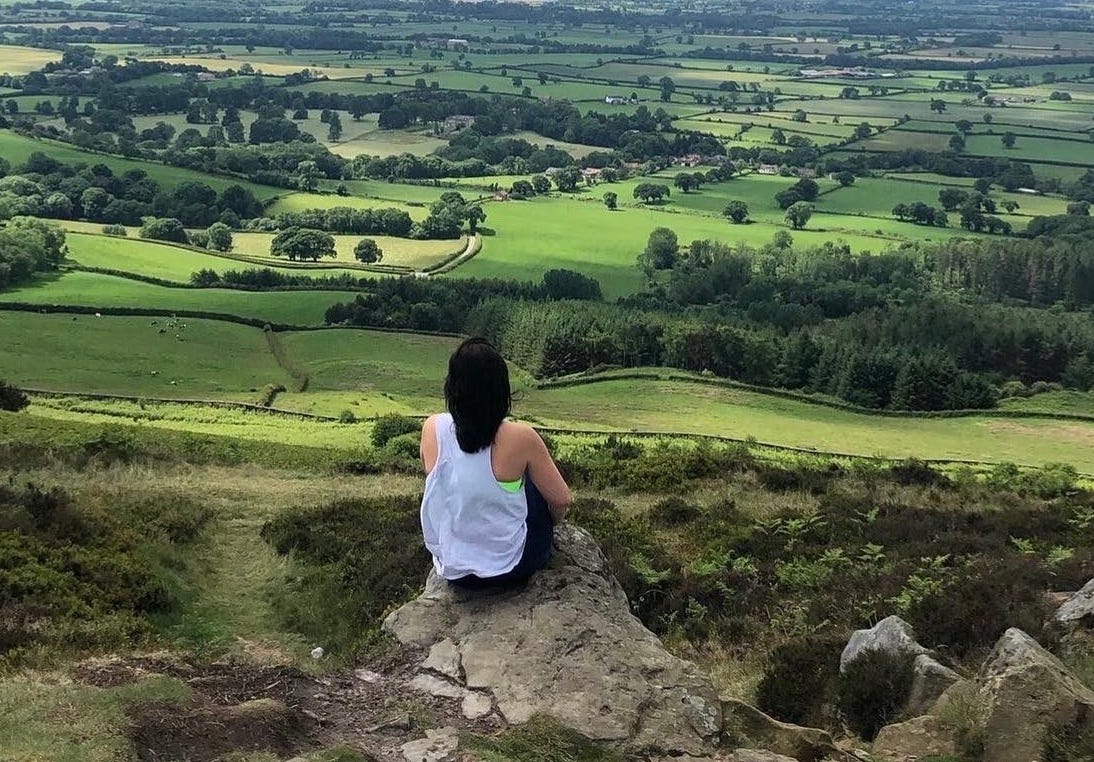Super Mario - The Ironman who always finishes with a smile on his face
Triathlete, coach and 20 times Ironman finisher Mario Massarelli on why endurance sport can help you find yourself
“In some races I am a little bit faster and in some races less so, but I always finish smiling.
“Because every time I am happy. There is something in every race that I love.
“Even in the races where I suffer a lot, where I have problems, where it was difficult to finish, at the end it is an incredible experience.”
As a 20 times Ironman finisher, Mario Massarelli knows what it is like to struggle during a race.
But the triathlete and coach is also convinced that while it is important to be competitive - after all, he has an age-grade world championship qualifying time to his name - the most important part of any endurance event is to enjoy it.
The 52-year-old Italian, who now lives in Spain, has gained such a love of the triathlon that he has given up his job as a high-flying executive to become a coach, running his own company Lifestyle Endurance.
Becoming an Ironman
Mario started running when he found his busy job as an executive in the tourism industry had taken it’s toll on his waistline.
“I was a little bit overweight,” he said. “Not a lot but I wanted to be in good shape.
“I started to run more frequently, and as you know when you run five, ten, 15km, then you start to think about whether to do a half-marathon or maybe a marathon.”
Running morphed into cycling after he picked up an injury, and when he needed to vary his exercise, he started to swim more.
“I’d always been a swimmer since I was a child,” he said. “Not a very good one, but a normal swimmer.”
When his initial injury cleared up, he found himself doing all three sports - and triathlon was the natural next step.
It was then that his career in business began to shape his athletic endeavours.
Also on Running Tales…
“I had spent 20 years as a business executive, so I am a little bit objective driven. I thought that in one year I would be an Ironman.
“So I decided that in three months I would do a short triathlon race and then in six months the Olympic distance.
“I booked all of those races on the same day.
“This is something that can help a lot. If you are thinking to do something, go and book your first race and you will see that your mind will immediately click.
“You will say, ‘now I have something that is coming up’ and your mind is changed and you will train better. You will wake up ready to train.”
A year later, Mario completed his first Ironman at 46 years old.
Competing hard - but for fun
These days Mario is a seasoned Ironman competitor, with a best time of 9:42:55 at Barcelona in 2021 and a spot in the The Ironman All World Athlete rankings.
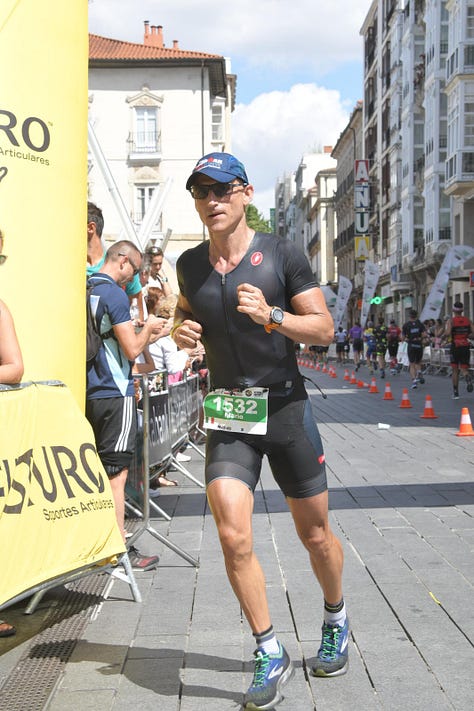
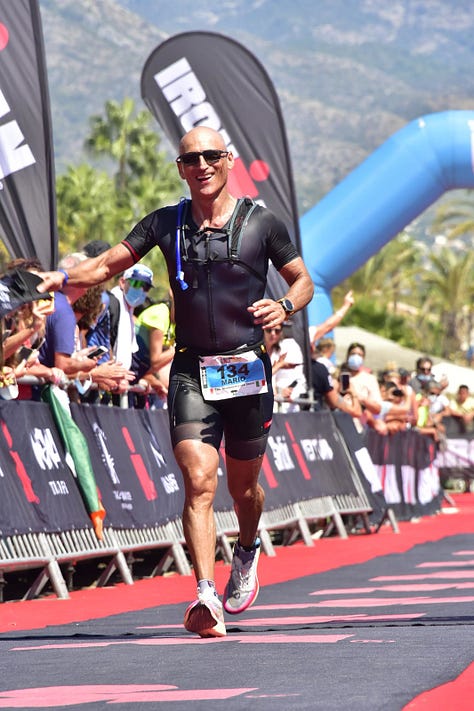


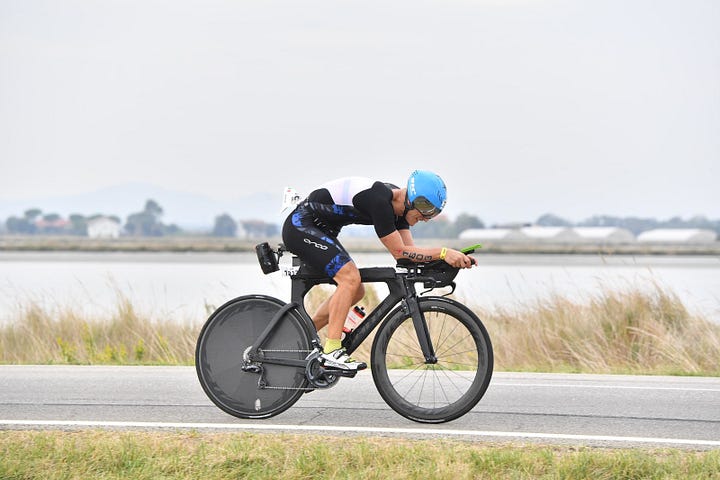
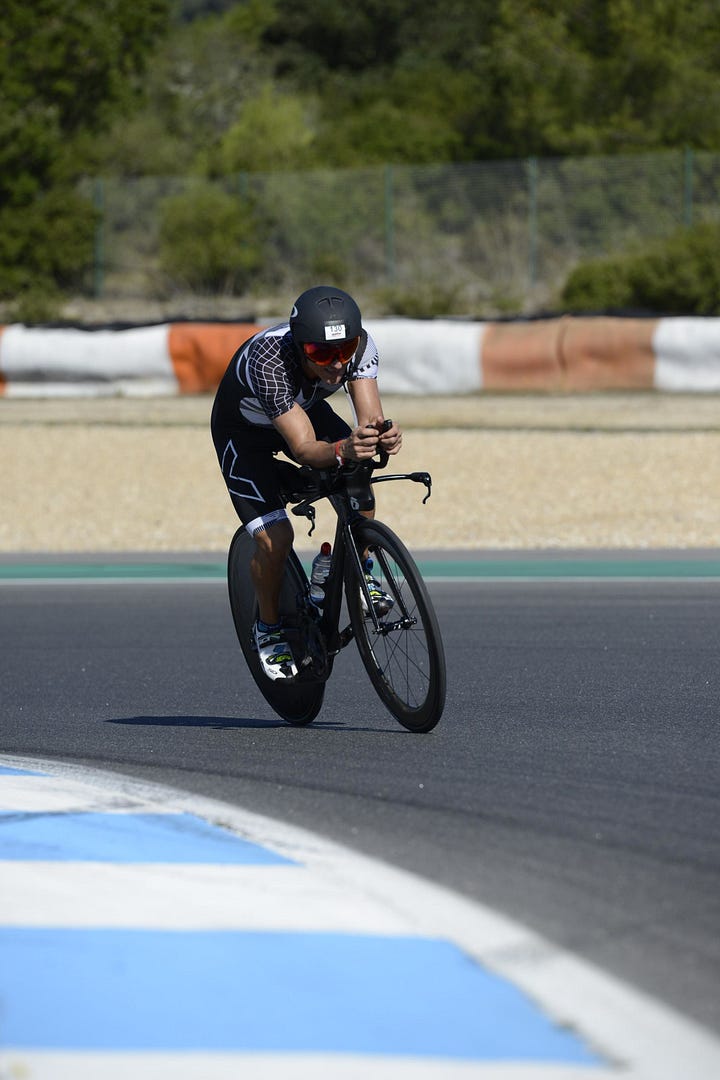
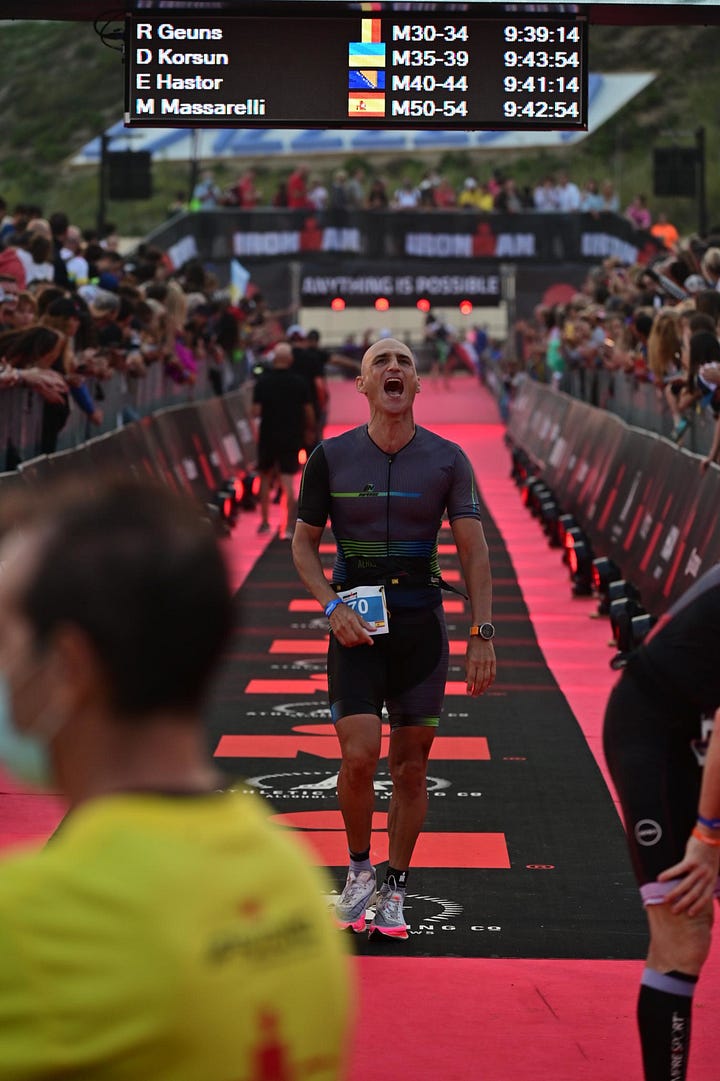
But he told Running Tales his philosophy is more about wellness than permanently having a competitive mind.
“It is about using the sport to live a better life,” he said.
“Of course, afterwards you can say I did a better race - but my best memories are not from the races where I did my personal bests.”
Asked if his first Ironman remains his hardest, he smiled - and then said no.
“When you do your first IronMan, you normally just want to finish it so you don’t push too much as you don’t know your body and where your limits is.
“After all, you’ve never done this before.”
Mario’s first marathon came as part of that Ironman - “Many people run our first marathon during our first Ironman because the marathon is a lot of effort for your body, and you need months to recover well” - and he is not afraid to admit it involved plenty of walking.
“Let me tell you a secret,” he said. “If you go and see a marathon during an Ironman, if you exclude the top people, many people walk for long parts of it.
“There are very few people who run the whole marathon during an Ironman. Now, I can say I run for all the marathon during my Ironman - but not in the first!
“I walked part of the marathon and so at the end I was feeling very well. But in the next Ironman, I wanted to improve.
“When you decide to push for the whole race, you bring your body to its limits.”
His toughest experience came in Copenhagen in 2021.
“I was in very good shape and wanted to break all of my records. But it was not my day.
“I started pushing at my best during the swimming and I started to push like a crazy guy on my bike.
“But it was very windy. That meant I could not be as fast as I had programmed in my mind, so I started the marathon feeling very tired.
“Again, I wanted to push, so I started running very fast. After maybe a half-marathon, I hit the wall.
“I didn’t have any more energy, and it was really terrible. It was the first time that had happened to me in a race.
“I had to stop running and was walking. Every time I race, my partner watches me and normally I am running and she will cheer me - but this time I was walking.
“She asked me if something was wrong, and I said I just had no energy. So she said ‘come on, there is just 20kms left’ - but at that moment 20kms for me was like 200km.
“In the end, step by step, you get there. This is where you find your mental strength to go through the difficulties. It is not about being courageous, but just to think in a lucid way.
“I said, ‘ok, this is not the day, no record, no personal bests, but you are ok, you are not injured, so go to the next table and drink more, walk a bit and then run for a kilometre’.
“And I made it to the end, and arrived with a smile at the finish line.”
‘To go alone, to run for one or two hours, is priceless’
Mario’s wellness mantra extends beyond the triathlon races.
He told Running Tales he finds the solitude of training sessions therapeutic, and is a champion for the benefits of running and exercise for wellbeing.
“Triathlon is a sport which you train for a lot on your own,” he said. “It can be a lonely sport, but you it is important to incorporate your training in your lifestyle.
“If you have family commitments, you can wake up early and go, and afterwards you can see them.
“In a life where we have a lot of commitments - job, family, everything - this should be something you like to do, not just another commitment.
“And it is time you get to yourself. Lonely is something I like. Sometimes I train with friends, but it’s not something I miss.
“For me, it is good to train alone. In life, we don’t have a lot of time for ourselves.
“To go alone, to run for one or two hours, is priceless.”
He said this is a philosophy he wants to pass on as a coach.
“Triathlon is one of the best ways to live better and to live a healthy lifestyle,” he said.
“I feel something special when I see people not just improve their time or finish a half-marathon or a marathon or an Ironman, but feeling better, more happy and more energetic.
“This is the moment where people are dreamers. They dream to achieve their first big, important goal.
“I’m in a part of my life, now I’m 52, where luckily I can choose to do what I love and help people.”
Keep an eye out for plenty more people finishing races with a big smile on their face.





